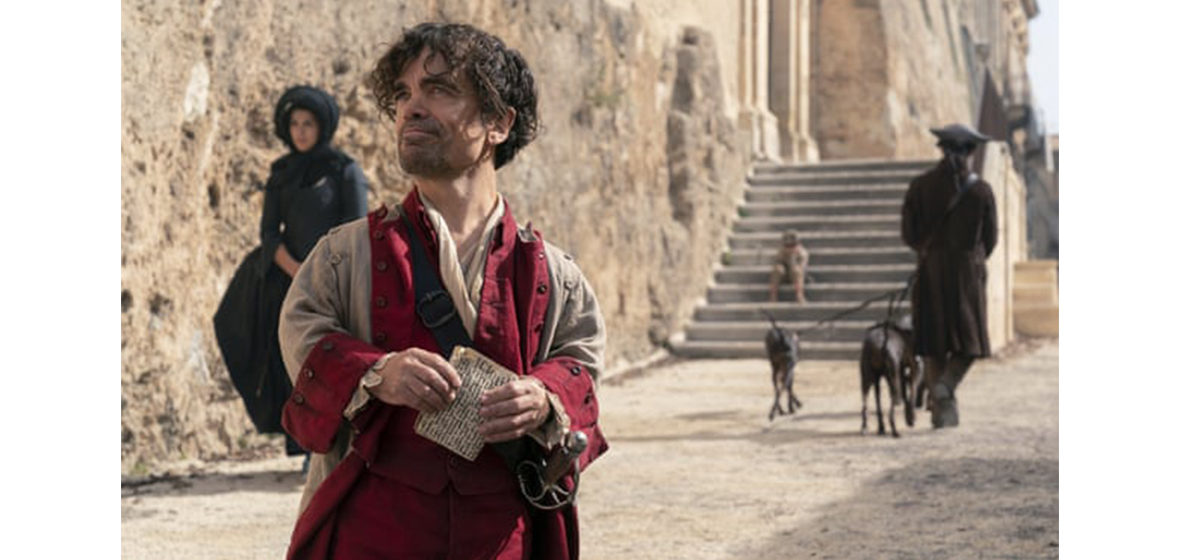Rating: ***
When Joe Wright adapts a literary classic, you never know what’s around the corner. Will he elevate the original text with manic modernity like in Pride & Prejudice or Atonement? Will he disregard or misinterpret the author so he can indulge in a deranged stylised film like his adaptions of Anna Karenina and Pan? Is he going to bore us with the mundanity of The Darkest Hour and The Woman in the Window? As a filmmaker, Wright is not much of an enigma but has inconsistent composure. An ecstatic artist so keen to include every single idea he has, regardless of how rash it is.
Thankfully Cyrano is one of good ones. The twist here is Edmond Rostand’s play is adapted as a musical performed in the barren medieval streets of a Sicilian village. Visually it adds to the story a tragic background that feels old and out of place, like we’re watching an exceptional performance in the ruins of a convent. It contrasts tremendously well with a start, set inside a theatre (there you go), where the set is over-designed in colourful swathes of candles and satin. The rest of the film, against white stones and stripped decors, bears its heart and soul in its frizzled sleeve.
The second twist in this adaption is the songs by band The National – music by the twin brothers Aaron and Bryce Dessner and lyrics by Matt Barninger and his partner Carrin Besser. It’s one of those groups whose sound is instantly recognisable without being overwhelmingly repetitive. Their 2007 record Boxer features lavish orchestrations and quiet chamber moments that could pretty much have been preparation for this film. Adapting their sound to different voices, including women, was easy if everyone sings with that same pronounced intonation of Berninger, and the romantic subject doesn’t go too far from the band that once wrote: “Let’s not try to figure out everything at once /It’s hard to keep track of you falling through the sky.”
The story you likely already know. Cyrano is an unparalleled duellist and poet insecure about his physical flaws (in the play, a gigantic nose, in this version, Dinklage’s achondroplasia). Because of that, he could never profess his love for the beautiful Roxanne (Haley Bennett), another lover of good words and poetic sensibility who is trying to delay her eventual matrimony to De Guiche (Ben Mendelsohn). Roxanne falls in love with the young Christian (Kelvin Harrison Jr.), whose good looks do not match his talent for elegant prose. Here enters Cyrano, who takes over his voice and writes Roxanne beautiful romantic letters in the name of Christian to give him the one thing he believes he could not get.
Dinklage plays Cyrano bearing his sweat and guts, like he understands the role like no one else could. The famous scene the play is known for, where Cyrano feeds lines to Christian as he recites poetry under Roxanne’s window, is a decisive moment of acting, mise-en-scéne and singing. Dinklage’s voice doesn’t match Berninger’s woeful baritone but finds his tragic pain in it. If there’s an injustice in this year’s Academy nominations, it is that Dinklage wasn’t even rewarded with a spot in a category he should have won.
For all its great choices, the film’s last quarter almost undoes it all. It comes right after a long and beautiful song where three men (including a cameo from Once’s Glen Hansard) sing about their last words to their partners before heading to battle; it’s a lovely moment of purity that connects with the rest of the film – populist, entertaining but, thankfully, genuine. After that, Wright and writing partner, Erica Schmidt, steer away from the rest of the play and indulge in a series of over-the-top ultra-romantic moments, like they hoped that they had earned the chance of having their cake and eating it too. It detaches from the rest of the story, adds a fake-Shakespearean flair the film never did, and contrasts awkwardly with the emotionally menacing tone of the songs.
Apart from this odd disparity, Cyrano is worthy of our time. I always go back to the beginning of the play. The original text also has it, but here Wright pours so much of his heart out, making a statement. Like it was at the time, the play is a rowdy affair where the audience shouts and hollers and the actors like they’re watching a gladiator fight. In this scene that Wright elaborately dresses, he’s sending a message for the rest of the film: give the people what they want. Blood, love and tears.




